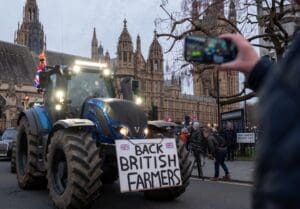The duty paid on drinks on tap in pubs will be up to 11p lower than at the supermarket. The changes are designed to help pubs compete on a level playing field with supermarkets, so they can continue to thrive at the heart of communities across the UK.
The Brexit Pubs Guarantee announced in the Chancellor’s Spring Budget secures the pledge that pubs will always pay less alcohol duty than supermarkets going forwards.
It comes as other landmark changes to the alcohol duty system also come into effect today, which see drinks taxed by strength for the first time and a new relief – named Small Producer Relief – to help small businesses and start-ups create new drinks, innovate and grow.
Today’s changes have automatically lowered the duty in shops and supermarkets on many of the UK’s favourites including certain bottles of pale ale, pre-mixed gin and tonic, hard seltzer, Irish cream, coffee liquor and English sparkling wine, amongst others.
Prime Minister Rishi Sunak said: “I want to support the drinks and hospitality industries that are helping to grow the economy, and the consumers who enjoy the end result.
“Not only will today’s changes mean that that the price of your pint in the pub is protected, but it will also benefit thousands of businesses across the country.
“We have taken advantage of Brexit to simplify the duty system, to reduce the price of a pint, and to back British pubs.”
Jeremy Hunt, Chancellor of the Exchequer, said: “British pubs are the beating heart of our communities and as they face rising costs, we’re doing all we can to help them out. Through our Brexit Pubs Guarantee, we’re protecting the price of a pint.
“The changes we’re making to the way we tax alcohol catapults us into the 21st century, reflecting the popularity of low alcohol drinks and boosting growth in the sector by supporting small producers financially.”
The three alcohol duty changes that have taken effect today are only possible thanks to the UK’s departure from the EU and the guarantees set out in the Windsor Framework. The previous duty system was complex and unfair but now that the UK is free to set excise policy to suit its needs, the government has brought about common-sense reforms in order to support wider UK tax and public health objectives.
Brexit Pubs Guarantee
Over 38,000 UK pubs will benefit from lower alcohol tax on the drinks they pour from tap from today. This is because the government has expanded Draught Relief, which effectively freezes or cuts the alcohol duty on the vast majority of these drinks. This is to protect pubs, who are often undercut by supermarket competitors.
It means that the duty they pay on each drink poured from draught, such as pints of beer and cider, will be up to 11p cheaper than in supermarkets. The government has pledged that the duty pubs and bars pay on these drinks will always be less than retailers, known as the Brexit Pubs Guarantee.
This tax reduction is part of a wider shake up of the alcohol duty system which also comes into effect from today – the biggest in 140 years.
A simpler, more modern alcohol duty system
The alcohol duty reforms were announced at the Autumn Budget in 2021. The reforms pledged to modernise and simplify a duty system that had not been changed in 140 years, only possible as the UK has left the EU.
The key changes are:
all products taxed in line with alcohol by volume (ABV) strength, rather than different duty structures for different drinks
fewer main duty rates, from 15 to 6, to make it easier for businesses to grow and operate
there will be lower taxes on lower alcohol products – those below 3.5% alcohol by volume (ABV) in strength – a huge growth area in the drinks industry
all drinks above 8.5% ABV will pay the same rate regardless of product type
This will mean that many UK favourites will see duty reductions. Irish cream will drop by 3p, cans of 5% ABV ready-to-drink spirit mixers by 6p, Prosecco by 61p and 500ml 3.4% pale ale by 20p a bottle.
New tax relief to encourage small producers to make new drinks
The UK alcoholic drinks market reached just under £50 billion in 2022, up 6% year on year and is expected to continue to grow – sales are forecast to reach £60.9 billion in 2026. The UK government is laser-focused on continuing this burgeoning success.
The government is introducing Small Producer Relief effective from today, which replaces and extends the previous Small Brewers Relief scheme.
This allows small businesses who produce alcoholic products with an ABV of less than 8.5% to be eligible for reduced rates of alcohol duty on qualifying products. The new tax relief scheme promotes innovation in the drinks sector, giving small producers the financial freedom to experiment with new types of drink and grow their business. It also supports the modern drinking trend of lower alcohol beverages.
Barry Watts, Head of Policy and Public Affairs, Society of Independent Brewers, said: “These are the most significant changes to the alcohol duty system for generations which will have far reaching implications for what we order in the pub and what appears on the shop shelves. It is the culmination of five years of consultation on the future of Small Breweries’ Relief – a scheme that has made the huge growth of craft breweries possible over the past twenty years. These changes will finally address the “cliff edge” which was a barrier to small breweries growing and build on the scheme’s success by applying it to other alcoholic products below 8.5%.
“A key part of the new system is the draught duty relief is a gamechanger for the sector and allows for the first time a different duty to be paid for what is sold to our pubs. This will hopefully over time encourage more people to support their pub which is at the heart of our local communities.”
James Hayward, Director and Head Brewer at Iron Pier Brewery, Gravesend, added: “As a small brewery with a focus on cask ale, we welcome the new draught duty relief, alongside the revision of the small producers relief, which has in the past proved a restriction to growth over 5,000hl per annum. The idea that beer sold in pubs can now pay a lower rate of duty than supermarkets is a good one and will hopefully lead to further changes to protect the pub and its role in society. The previous Small Brewers Relief was successful in creating a diverse brewing industry in the UK, and to see that extended to other producers will hopefully have a positive effect on other beverage producers as well.”




